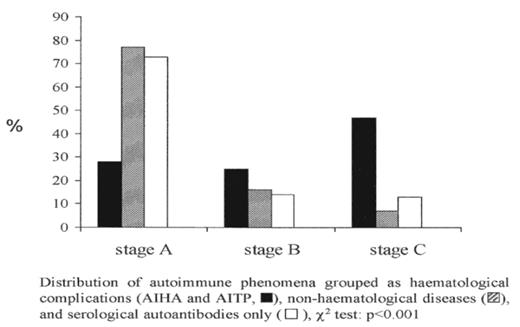Abstract
Autoimmune haemolytic anaemia (AIHA) and thrombocytopenia (AITP) are known complications of B-cell chronic lymphocytic leukaemia (B-CLL), whereas there are only few reports on other autoimmune diseases and on serological markers of autoimmunity. In this multicentric GIMEMA study we investigated the presence of different autoimmune phenomena in B-CLL (haematological cytopenias, other autoimmune diseases, and serological markers of autoimmunity) and their relationship with B-CLL stage and therapy by multivariate analysis.
Among the 194 cases recorded, the more frequent complication was AIHA (66%), followed by AITP (18%) and other autoimmune diseases (16%). The occurrence of autoimmune complications was associated with advanced and multi-treated disease, as demonstrated by multivariate analysis, which identified age over the median, stage C and I and II line therapy as independent risk factors for autoimmune complications. The distribution of the autoimmune diseases was different with respect to stage and therapy, in that AIHA and AITP were typically present in advanced and multi-treated disease, whereas the non-haematological autoimmune complications were mostly observed in early B-CLL. Interestingly, fludarabine treatment was not associated with an increased risk of AIHA. In addition, 41% of B-CLL patients, mostly in stage A, showed positive serological markers of autoimmunity.
Non-haematological autoimmune complications, although usually less severe than haematological ones, should be carefully searched for, particularly in early B-CLL patients. The distribution of autoimmune diseases with respect to stage and therapy suggest the existence of different pathogenic mechanisms underlying haematological and non-haematological autoimmune phenomena in B-CLL.
Distribution of autoimmune phenomena grouped as haematological complications (AIHA and AITP, ▪), non-haematological disease (***), and serological autoantibodies only (□), χ2 test: p<0.001
Distribution of autoimmune phenomena grouped as haematological complications (AIHA and AITP, ▪), non-haematological disease (***), and serological autoantibodies only (□), χ2 test: p<0.001
Disclosure: No relevant conflicts of interest to declare.
Author notes
Corresponding author


This feature is available to Subscribers Only
Sign In or Create an Account Close Modal